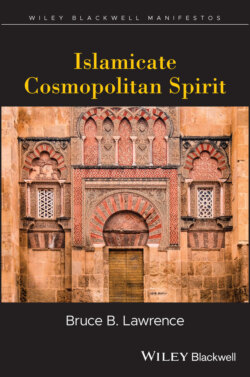Читать книгу Islamicate Cosmopolitan Spirit - Bruce B. Lawrence - Страница 11
Why Cosmopolitan? Because it Values Bi-location in Two Worlds
ОглавлениеIslamicate both complements and qualifies cosmopolitan because “cosmopolitan,” like Islamicate, is a category in flux. It has often been linked to Europe or the European enlightenment as an encompassing expression of mobility, generosity, and tolerance, yet cosmopolitan is broader than Europe, having an ecumenical reach that literally encompasses the Afro-Eurasian ecumene; that is, the inhabited world as it was known for more than two millennia.7 There are so many competing definitions of cosmopolitanism that it seems preferable to list some of these scholars before declaring which I choose to present and defend in this manifesto. All are acknowledged leaders in social scientific engagement with cosmopolitanism, and since one collected volume has included their analyses, I list six options from Vertovec and Cohen in order to highlight the enigma they collectively pose:
Cosmopolitanism may be a cultural, and cognitive, orientation, specifically, “the ability to stand outside a singular location (the location of one’s birth, land, upbringing, conversion) and to mediate traditions.”8
But cosmopolitanism may also be the social experience of difference without threat, above all, in urban locations, where one moves through offices or zones of the city “reconciling alterity and rigidity, or alterity and rationality, with a notion of temporary identification.”9
Cosmopolitanism may also not be individual but collective, an awareness oriented toward an agonistic democratic process, one that involves communities who find themselves “in that open space that requires a kind of vernacular cosmopolitanism.” Cosmopolitanism is then not about an individual life style nor a universalist morality nor global political institutions, but rather it is about the “vision of a cosmo-polis, a global community of citizens.”10
More specifically, cosmopolitanism might project an inclusive democratic strategy. While cosmopolitanism is presumed to be inherently urban, elitist, and consumerist, might it not also involve redefining social solidarities to engender mutual commitment and responsibility from the greatest number of citizens? In this case, “cosmopolitan democracy depends on finding ways to relate diverse solidarities to each other rather than trying to overcome them.”11 Implicit in all the above is what has been openly stated by other social scientists: the cosmopolitan has to engage nationalism, and so for two other theorists, it is not just citizenship but nationalism, as also redefining national identity as a modern reflex of global capitalism, that must be at the core of any cosmopolitan project. Yet nationalism itself is not a consistent or constant analytical referent; it reflects at least two tangents of cosmopolitan sensibility.
Cosmopolitanism must be “modern” and national and that means: Option One. “There is no opposition between cosmopolitanism and nationalism. They emerged together, and they belong together in the context of an emerging capitalist world-system.”12 Or else:Cosmopolitanism must be modern and “global” and that means: Option Two. Cosmopolitanism is simply globalism writ large, that is to say, “the self-definition and public reflexivity of transnational ways of life and situations, not only at the top but also at the bottom and in the middle of an emerging society of world citizens.”13 Despite their seeming disagreement, Options One and Two converge in their focus on the necessity of national markers: every cosmopolitan must have a national identity, but at same time s/he needs to be committed to working against exclusive forms of national, ethnic, or local identity. What is presupposed and promoted is the vision of a cosmopolis, a global community of like-minded citizens, and that runs the risk of alienating or subjugating minorities, as Hannah Arendt has argued. It is precisely a resolute, if often unacknowledged, nationalist spirit that made cosmopolitanism impossible because it created the nation in terms of what it is not, that is, newly minted minorities without the rights of the majority. Cosmopolitanism becomes a form of neo-tribalism for elites only, caught between an imperial past and a totalitarian headwind.14 Suffusing all these definitional efforts is the thrust of a cosmopolitan ethos, and because it is an aspiration, like every ethical norm, it is more readily sensed in its adjectival than in its nominal form; the -ism suggests an ideological closure that the adjective resists. In the interest of openness, I speak of Islamicate cosmopolitan, not Islamicate cosmopolitanism. The frame in which I locate each Islamicate Cosmopolitan Spirit is the historical trajectory and capacious context of Islamicate civilization.
